The U.S. Fish and Wildlife Service’s latest rules and regulations on whistleblower rewards are for the first time being made publicly available by Whistleblower Network News. WNN became aware that Fish and Wildlife amended their whistleblower reward regulations in response to a 2018 Government Accountability Office (GAO) report. In their report, GAO examined Fish and Wildlife’s use of financial rewards as a possible tool for combating wildlife trafficking. The report found the existing system deficient. GAO asked Fish and Wildlife to bolster their whistleblower program for the express purpose of combating wildlife trafficking. Fish and Wildlife agreed with GAO’s findings and promised to respond by strengthening their program. Until WNN filed a Freedom of Information Act (FOIA) request, however, the agency never publicized their new regulations.
The documents from WNN’s FOIA request reveal to the public — and to potential whistleblowers — the rules that govern Fish and Wildlife’s financial rewards. These rules cover who is eligible for rewards and how sums are determined. This includes any disqualifying criteria, justifications necessary for rewards, and how much money can be awarded. Before WNN’s publication, the only information that Fish and Wildlife made public was this link, which merely notes that the policy is not disclosed due to “sensitive law enforcement information.” Without publicly available guidelines of these reward laws, whistleblowers do not know their rights. It is essential that potential whistleblowers know Fish and Wildlife’s rules before they blow the whistle.
When it comes to fighting illegal wildlife trafficking, “these whistleblower regulations are a very important tool in the toolbox”, says Scott Hajost, Chairman of Thinking Animals United and Senior Wildlife Policy Advisor at the National Whistleblower Center. Hajost points to the fact that whistleblower rewards “have been recognized by the USAID supported Wildlife Crime tech challenge” for their impact in enforcement. Hajost highlights the importance that all organizations involved in combating wildlife trafficking be aware of these regulations, as multiple government agencies, from GAO to USAID, have made clear.
The GAO report recommended Fish and Wildlife alter their reward program because the agency’s existing rules were not leading to as many cases as other departments. GAO “found that [Fish and Wildlife] have not prioritized offering rewards,” and urged the rule changes as a remedy. Strong whistleblower reward programs are a major tool to fight illegal trafficking. The government’s recommendations specifically included a call to increase communication with the public about financial reward opportunities to better inform potential whistleblowers and law enforcement officers. In addition, they recommended Fish and Wildlife “implement any changes that the agency determines would improve the usefulness of financial rewards as a law enforcement tool.”
Fish and Wildlife publicly agreed to the recommendations of the report, but the positive effect of the changes was nullified because their regulations remained undisclosed. Making these regulations available to anyone is an important step in the right direction for the whistleblower reward program. This information serves the public, it serves Fish and Wildlife’s law enforcement purposes, and it serves our natural environment that suffers when wildlife trafficking goes undetected.
The Regulations can be found in full at the bottom of this article. Notable departures from standard whistleblower regulations are reprinted and highlighted here.
Under “Mechanics of Paying Rewards” the manual covers how the amount of the award is determined. This statute gives Fish and Wildlife the discretion to pay up to 100% of the amount of sanctions. Similar laws have set mandatory minimums and maximums. For example, the Act to Prevent Pollution on Ships (APPS) sets the maximum at 50%, the False Claims Act (FCA) sets a minimum of 15% and a maximum at 30%, Wildlife trafficking laws have no mandatory minimum or maximum:
How the amount of the reward was chosen (statutes the Service enforces generally do not specify reward amounts, so Service officers must take into account the factors in section 2.78(8) when determining the amount of a reward). Section 2.7 (B)8(i)
Still, Fish and Wildlife’s regulations mostly follow a similar structure to other whistleblower reward laws: whistleblowers are eligible for monetary rewards if they give information that “contributes significantly” toward a successful investigation.
One other potential point of departure is the statutory time frame a whistleblower has to request a reward. Several other reward laws require whistleblowers to initiate their reward request at the time they give their help to law enforcement, and before the conclusion of the case. Fish and Wildlife leaves this time frame ambiguously open:
If legal proceedings are not completed prior to the request, we must provide a reason why the reward is being requested beforehand and include a statement confirming that the prosecuting attorney concurs with payment. Section 2.7 (B)8(b)
Fish and Wildlife has not yet confirmed that their rule allows whistleblowers to request a reward after the conclusion of legal proceedings. If this is the case, as their rule implies, then whistleblowers who assist investigations before knowing their rights can still have access to the rewards to which they are entitled.
U.S Fish and Wildlife Service Law Enforcement Manual
Copyright © 2021, Whistleblower Network News. All Rights Reserved.
